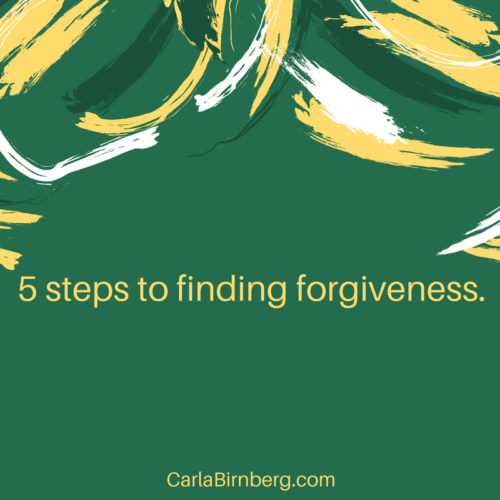
Recently we had a life-debacle which, though there were silver-linings to be found, left the Child and me struggling with the notion of forgiveness.
We’re not ones to hold grudges, yet we couldn’t quite figure out how to embrace our feelings so we could process and move past them.
We wrote about our struggles. We kept ourselves occupied with frivolous stuff. We both pretended we’d moved on when, underneath it all, neither of us had.
Sure we could distract ourselves for a day or three, we just hadn’t found our way to permanent forgiveness.
Finally we simultaneously discovered it was because neither of us knew how to to carve that particular path.
We needed to decide we wanted to forgive.
As simple a decision as this seems in hindsight it required hours of talking and debating to arrive at this feeling.
However when we did what she and I experienced backed up all the research.
- Forgiveness would make us happier. We were living the notion of not forgiving being like taking poison and waiting for the other person to die. It was only harming us and there was the greatest of chances the other person was wholly unaware of our feelings.
- Forgiveness would help us physically. Studies suggest holding grudges compromises our immune systems and make us less resistant to illness. Whether that’s true or not, the Child had definitely experienced lack of sleep and stomachaches.
- Forgiveness would increase feelings of connection. Through clinging tightly to our grudge we’d metaphorically hardened our exteriors. When humans forgive we’re more likely to volunteer and help others (the Child & I liked to think we’d do this anyway, but for argument’s sake let’s go with the research).
We concluded we were ready to forgive.
As with many things in life we soon realized the act of forgiveness might be easier said than done.

1. Identify what happened.
We challenged ourselves to articulate precisely what transpired. You might talk with a friend, journal or even say the experience aloud to your reflection. Be detailed in the description. Step 1 may seem simplistic/obvious, yet I’ve experienced situations where I was at a loss with regards to what had happened. I was hurt and sad, yet lacked the ability to identify why. This inability didn’t mean I wasn’t wronged; it did mean I needed to invest more time in reflection. If you can’t explain something simply you don’t understand well enough…yet.
2. Name it. Choose to feel it.
Instead of only naming or feeling the Child and I chose to add an element of humor into step 2. We bestowed upon the scenario a silly nickname. As a result, each time we referred to the incident, we’d incorporated a needed layer of levity. It helped. A lot. Before humor would work, however, we needed to decide we wanted to feel. We needed to choose to embrace all the emotions so we could move past grudge-holding toward forgiveness. Sure there existed an inclination to cling to the sadness/disappointment and make it our new story. I chose to resist this pull. I’m grateful the Child did, too.
I’m a believer in needing to metaphorically ‘move through‘ feelings in order to process/overcome. This scenario and its unique mix of grief/anger/sadness/disappointment surprised me with its need for literal and metaphorical movement in order to release. I employed trial & error with step 3 until I discovered what worked (beginning with meditation and making my way from there). The Child, who’s apparently more body aware than I these days, nailed her movement on the first try: the trampoline. Not only did this step physically exhaust us; it facilitated our visualizing anger and disappointment exiting our bodies and in its place growing forgiveness.
In forgiveness, one seeks calm and understanding which emerges when we blame others less (no matter what transpired) and choose to take all interactions less ‘personally.’ When we forgive we learn (or relearn as was the case here) one of life’s most important lessons:
It’s rarely about us. The way others treat/react to us is a direct reflection of their experience.
5. Reboot.
When we finally arrived at step 5 we were more than ready for a reboot. We’d done the work. We’d processed. We were eager to channel our energies toward creating a way to get our needs met from a different place than the interaction which had disappointed (vague-blogging for privacy). We were prepared to shift away from viewing ourselves as victims/individuals life happened to. No matter what had occurred in the recent past we chose to release any ‘power’ the situation held in our (emotional) lives and commit to a fresh start.
Five steps.
Almost an eight week process.
Worth every moment of hard work and time invested on our end.
And you?
- Do you struggle to forgive others for perceived wrongs? Do you struggle to forgive yourself?
 Annmarie says
Annmarie says
May 8, 2017 at 4:46 amForgiveness is so hard but like you said, not forgiving is a heavy burden to carry. I try not to hold grudges either although it can be challenging. This is a great guide on how to learn to forgive in a healthy, constructive way.
 Bea says
Bea says
May 8, 2017 at 5:30 amYes!!
I am so tired of hearing forgive and forget from well-meaning people. I had no idea where to begin.
 Allie says
Allie says
May 8, 2017 at 5:06 amI have been dealing with a similar situation since last August!! Too long. The whole situation hurts so much but I think I’m ready to start to process it and maybe reach out to person who was involved. It’s so, so, so hard and I try to convince myself I don’t care that much but, I think about it most days so…
This was VERY helpful! Thank you.
 Susie @ Suzlyfe says
Susie @ Suzlyfe says
May 8, 2017 at 5:23 amI think so often that forgiveness is elusive because you truly do not WANT to forgive the person/place/thing for what happened. You WANT to continue to blame them. I am masterful at holding grudges.
 Coco says
Coco says
May 8, 2017 at 6:35 amHmmm. I think it depends on the situation. I’m able to let a lot go. And to assume that it’s more about them than me. But does the need to forgive depend on the relationship – or depend on their being a relationship? There’s a certain thing you know about that I hadn’t even contemplated forgiving. I’ve dealt with it and moved on, but if I ever encounter the person again I will still be holding it against him for sure.
 messymimi says
messymimi says
May 8, 2017 at 7:05 amThe words come easy, the work comes hard, and i appreciate the way you broke the work down into steps.
 Leanne | www.crestingthehill.com.au says
Leanne | www.crestingthehill.com.au says
May 8, 2017 at 8:13 amI might need this process – my daughter has just written me a very angry email about how insensitive I am and how I have horribly hurt her by publicly saying what I did about Mothers Day – looks like I’m down a daughter for the forseable future – not completely unexpected but it makes me sad to think that it’s always my fault for feeling like I’d like to be a bit more ‘special’ at times *sigh*
 Paula Kiger says
Paula Kiger says
May 8, 2017 at 12:08 pmI am so sorry Leanne — and I JUST read your post so it is fresh in my mind. I wish I had some sage advice. I think at a minimum the situation probably represents some complexities for her that could have been said in a thousand better/different ways (or, preferably, not said at all). Forgiveness definitely is a gift we give ourselves (I know, a cliche) but it is not the easiest thing to dole out.
 Haralee says
Haralee says
May 8, 2017 at 8:21 amI just have to say these lessons and many others you share with your readers and with your daughter are brilliant and outstanding. She will continue to grow up with an advantage that eludes many adults! Forgiveness and how to find it is huge at any age.
 Pam says
Pam says
May 8, 2017 at 11:14 amI find it quite easy to forgive some but not all. Which is crazy. It’s not like I don’t understand the process or the liberation that comes when we finally do forgive. But forgive myself? Probably never. My mother is the grudge holder of all grudge holders so I try hard not to be that way. Thanks for sharing your experience.
 Priscilla says
Priscilla says
May 8, 2017 at 11:45 amNeeded this. Hugs to you both!
 Deborah @ Confessions of a mother runner says
Deborah @ Confessions of a mother runner says
May 8, 2017 at 12:33 pmI think it depends on the situation. there is one particular family member who I think I forgive too often and she then takes that a cue to keep doing and saying things that need to be forgiven. It’s a tough one sometimes
 Ann says
Ann says
May 8, 2017 at 12:41 pmThe one thing I found with forgiveness is that it’s not something you give to the other person–you forgive someone else, and do it for yourself. It eased a huge burden of hurt and anger from my life when I was able to forgive my ex.
 Jody - Fit at 59 says
Jody - Fit at 59 says
May 8, 2017 at 1:39 pmI struggle to forgive myself – big issue here! Yes, sometimes others if it is really bad but myself is the larger issue.
Great post Carla.
 Roxanne Jones says
Roxanne Jones says
May 8, 2017 at 2:12 pmYou and your daughter are so lucky to have each other, and this post is just another amazing example why! I struggled with forgiveness–particularly toward some family members–for many years, until I finally “got” the concept that it doesn’t mean condoning the offender’s behavior, nor does it mean you even have to let that person back into your life. It simply means letting go of the anger/hurt/resentment so these toxic feelings don’t keep you connected at that level any more, nor do they consume your own peace of mind. It’s liberating!
 Ellen Dolgen says
Ellen Dolgen says
May 8, 2017 at 6:22 pmWhat a great blog. It took me a long time to learn that forgiveness is a gift that we give ourselves. I love these tips. They are truly so helpful, as it can be a long arduous process without guidance. The end result is so freeing!
 Deborah says
Deborah says
May 12, 2017 at 12:12 amI think it’s easier to forgive if something was out of another’s control / they didn’t mean to hurt us / frustrate us on purpose.
I suspect I’m not good with forgiveness, but luckily haven’t had to worry too much about it yet.